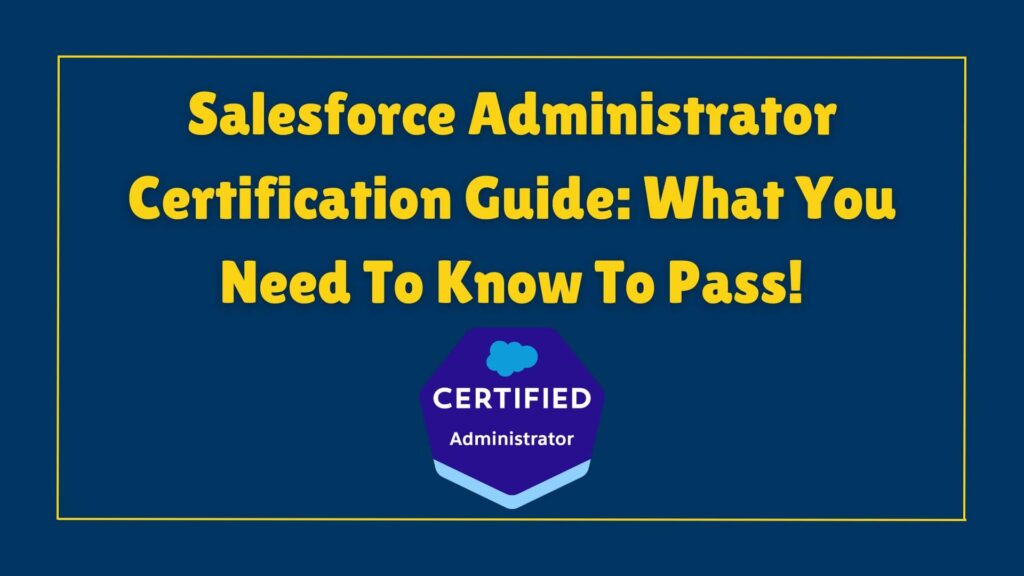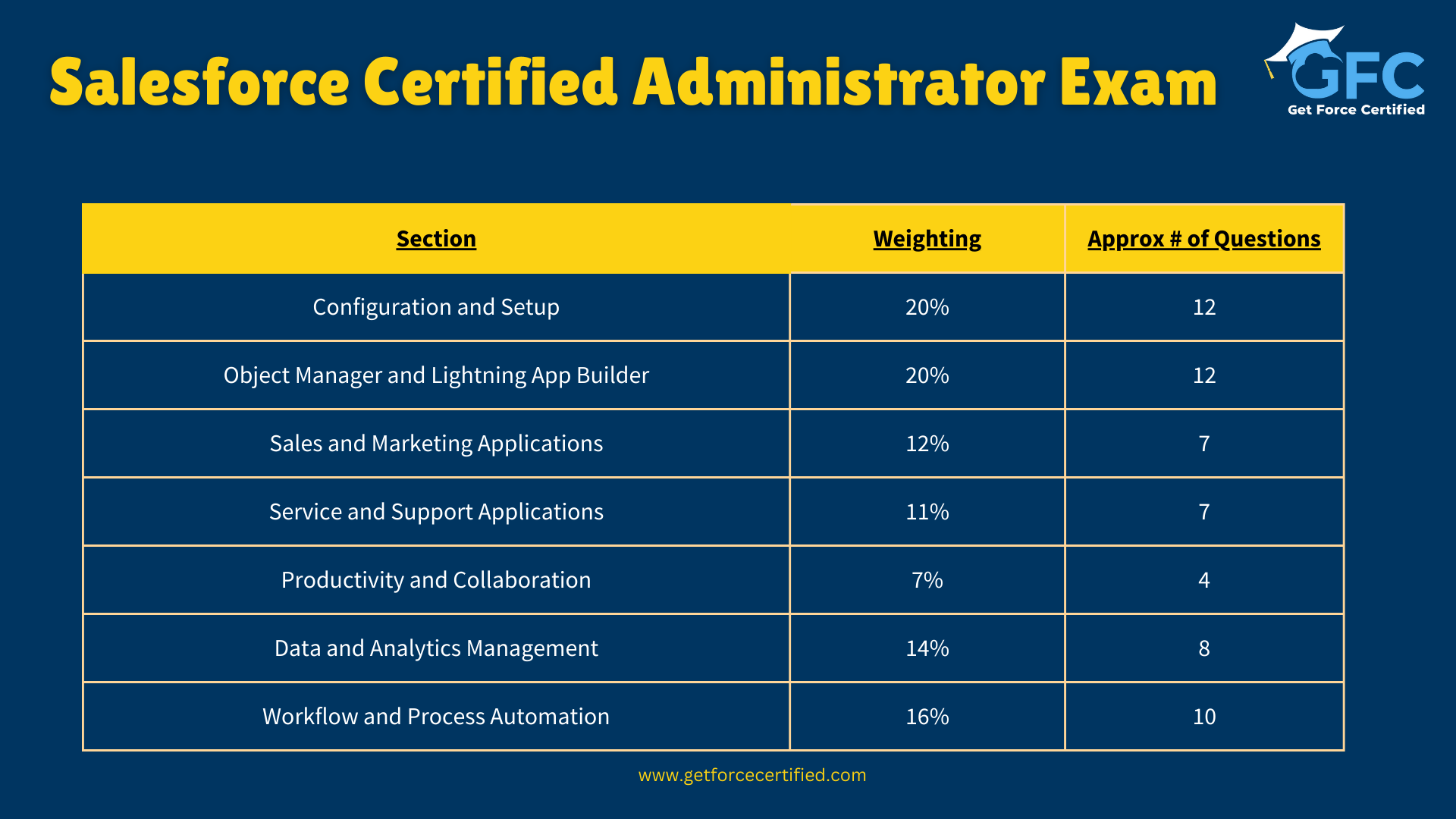Salesforce Administrator Certification Guide: What You Need To Know To Pass!

Salesforce Administrator Certification Guide: What You Need To Know To Pass!
The Salesforce Administrator Certification is one of the most, if not the most, important Salesforce Certification when you start your journey into the ecosystem. However, it’s also one of the hardest. Many Trailblazers are left asking…
“What do I need to know to pass the Salesforce Admin Exam?”
“How do I become a Salesforce Administrator?”
Without your Salesforce Admin Certification, it’s incredibly difficult to land your first Salesforce role ; Being a Salesforce Certified Administrator is pretty much a prerequisite for any Salesforce role. Without having that Certification on your CV or Resume you are going to find it difficult to enter the Salesforce Ecosystem.
That’s why we wrote this article. By the time you have finished reading, you will have a list of everything you need to know to become a Salesforce Certified Administrator.
Salesforce Administrator Certification Exam Overview
Let’s start with an overview of the Salesforce Admin Exam;
“The Salesforce Administrator credential is designed for individuals who have experience with Salesforce and continuously look for ways to assist their companies in getting even more from additional features and capabilities. The exam covers the breadth of applications, the features and functions available to an end user, and the configuration and management options available to an administrator across the Sales, Service, and Collaboration Clouds. ”
“Salesforce Certified Administrator candidates should have a general knowledge of the features available to end users and the configuration options available to a Salesforce Administrator. Candidates should be able to maintain a Salesforce organisation, respond to common business requirements, and perform administrative functions using current Salesforce features.”
What this means is that Salesforce Administrators need to know a lot. They need to be able to handle multiple aspects of configuring and maintaining a Salesforce Org. In other words, they need to have knowledge about a lot of Salesforce concepts, features, and best practices.
The exam itself consists of 60 multiple choice questions. Most questions will have 4 answers and you will be asked to pick the best one. There will be questions where you have to select multiple answers and you may have 5 or more possible answers to choose from. The key is to pick the best answer, don’t just go with the first answer you think is correct.
You have 105 minutes for the exam meaning that you have around 1 minute and 45 seconds per question. The passing score is 65% which works out at needing 39 correct answers to pass.
The cost of the exam is $200 plus tax and resits are $100 per resit. You can only sit the exam a maximum of 3 times in each release cycle (approximately 4 months).
My recommended resources include the Prepare for your Salesforce Administrator Credential Trailmix, The GFC Administrator Course and Mock Exams, and the Trailhead Practice Test.
There are no prerequisites for the Salesforce Admin Exam, however, if you are new to Salesforce I would strongly recommend that you take the Associate Certification first.
Salesforce Administrator Certification Exam Guide Breakdown

Configuration and Setup: 20% - 12 Questions
- Describe the information found in the company settings (for example: company settings fiscal year, business hours, currency management, default settings). – Company Settings
- Business Hours, Public Calendars, Public Resources, Company Information, Fiscal Years, Holidays, Language Settings, Currency Management, My Domain
- Distinguish and understand the administration of declarative configuration of the User Interface. (for example: UI settings, app menu, list views, global actions, Lightning App Builder). – User Interface
- User Interface Settings, App Menu, App Manager, List Views, Actions, Lightning App Builder, Page Layouts, Navigation Bar, In-App Guidance
- Given a scenario, demonstrate the proper setup and maintenance of users. – User Management
- Adding New Users, Adding Multiple New Users, User Record Page, Freezing Users, Deactivating Users, User Licences, Delegated Administrators, Login As Any User
- Explain the various organization Security Controls. (for example: Setup Audit Trail, Login Hours, Session Settings). – Organization Security Controls
- Setup Audit Trail, Login Hours, Login IP Ranges, Trusted IP Addresses, Password Policies, User Identity Authentication, Session Settings, Security Health Check
- Given a user request scenario, apply the appropriate security controls based on the features and capabilities of the Salesforce sharing model. (for example: public groups, org wide default, sharing: roles, subordinates, hierarchy, report and dashboard folders). – Salesforce Sharing Model
- Object Access, Record Access, Org Wide Defaults, Sharing Settings, Roles and Role Hierarchy, Sharing Rules, Team Sharing, Manual Sharing, Public Groups, Reports and Dashboard Sharing, Field Access
- Given a scenario, determine the appropriate use of a custom profile or permission set using the various profile settings and permissions. – Profiles and Permission Sets
- Profiles, Permission Sets, Permission Set Groups, Muting Permission Sets
Object Manager and Lightning App Builder: 20% - 12 Questions
- Describe the standard object architecture and relationship model. (for example: standard object, parent/child, master detail/lookup/junction relationships, and record types.) – Objects and Relationships
- Standard Objects, Custom Objects, Junction Objects, Salesforce Data Model, Lookup vs Master Detail Relationships, Other Relationships
- Explain how to create, delete, and customize fields and page layouts on standard and custom objects, and know the implications of deleting fields. – Fields and Page Layouts
- Standard Fields, Custom Fields, Deleted Fields, Apps, Tabs, Page Layouts, Related Lists
- Given a scenario, determine how to create and assign page layouts, record types and business processes for custom and standard objects.- Page Layouts, Records Types and Business Processes
- Record Types, Business Processes, Paths
Sales and Marketing Applications: 12% - 7 Questions
- Given a scenario, identify the capabilities and implications of the sales process. (for example: sales process, opportunity, path, and forecast impact.) – Sales Process
- Sales Process, Opportunity Stages, Forecasting, Quotes, Opportunity Splits, Orders, Contracts
- Given a scenario, apply the appropriate sales productivity features using opportunity tools. (for example: dashboards, lead scoring, Einstein opportunity scoring, and home page assistant.) – Sales Productivity
- Opportunity Tools, Products, Pricebooks, Lead Scoring, Einstein Opportunity Scoring, Assistant
- Describe the capabilities of lead automation tools and campaign management. (for example: leads, lead convert, lead assignment rules, campaign and campaign members.) – Lead and Campaign Management
- Leads, Lead Conversion, Lead Assignment Rules, Web to Lead, Campaigns, Campaign Hierarchy, Campaign Influence, Campaign Members
Service and Support Applications: 11% - 7 Questions
- Describe the capabilities of case management. (for example: case, case assignment rules, and queues.) – Case Management
- Cases, Case Assignment Rules, Case Queues, Merging Cases, Case Teams
- Given a scenario, identify how to automate case management. (for example: support process, case auto-response rules, and case escalation.) – Automate Case Management
- Support Process, Email to Case, Web to Case, Case Auto Response Rules, Escalation Rules
Productivity and Collaboration: 7% - 4 Questions
- Describe the capabilities of activity management. – Activities
- Tasks, Events, Group Tasks, Task Queues, Calendars, Repeating Events, Activity Timeline, Email Integrations, Einstein Activity Capture
- Describe the features of Chatter. – Chatter
- Chatter, Chatter Groups, Following, Out of Office
- Describe the capabilities of Salesforce Mobile App. – Salesforce Mobile
- Salesforce Mobile App
- Identify use cases for AppExchange applications. – AppExchange
- App Exchange
Data and Analytics Management: 14% - 8 Questions
- Describe the considerations when importing, updating, transferring, mass deleting, exporting and backing up data. – Data Management
- Data Management Tools, Data Import Wizard, Data Loader, Import Articles, Record IDs, External IDs, Transferring Record Ownership, Mass Tools, Data Storage, Data Backup, Data Export
- Describe the capabilities and implications of data validation tools. – Data Validation
- Validation Rules, Required Fields
- Describe the options available when creating or customizing a report or report type. – Reports
- Standard Report Types, Customer Report Types, Report Formulas, Report Builder, Report Charts, Report Grouping, Reporting Snapshots, Report Subscription
- Describe the impact of the sharing model on reports. – Report Sharing
- Report Folder Sharing
- Describe the options available when creating and modifying dashboards (e.g., dashboard components, data sources, chart types, Subscribing, running user). – Dashboards
- Dashboards
Data and Analytics: 16% - 10 Questions
- Given a scenario, identify the appropriate automation solution based on the capabilities of the tool. – Automation Tools
- Approval Processes, Workflow Rules, Process Builders, Flow, Order of Execution
- Describe capabilities and use cases for Flow. – Flow
- Flows, Types of Flows, Flow Components
- Describe capabilities and use cases for the approval process – Approval Process
- Approval Process
Preparing for the Salesforce Administrator Certification Exam
As you can see there is a lot of concepts that you need to know! It can often feel overwhelming, intimidating and somewhat like an impossible task. However, it isn’t! If you prepare the right way for the exam, not only will you know the concepts, but you will also understand them deeply. The key to passing the exam is being able to take the knowledge you have developed during your studies and apply it to various scenarios and real life situations.
The best way to learn how to do that is to follow the process of understanding the concept first, then the details. Then, you need to see it in action in a real life use case before you apply it to another business use case or challenge. Finally, you need to summarise the key points. This will create a deeper, more detailed and more relatable understanding of each topic and concept.
That is exactly how we teach you through our Guided Learning, so if you are finding yourself struggle to work through other resources such as Trailhead, Udemy, or slide based guides take a look at the Get Force Certified Administrator Certification Bundle. It is a comprehensive learning experience including clear, concise, and comprehensive video lessons, quick and easy to use cheatsheets, and accurate and realistic practice and mock exams.
Practice Exams
Speaking of practice and mock exams…
Just knowing enough isn’t enough to pass your exam. If you want to pass the Salesforce Certified Administrator Exam, you need to know how to take the exams so you can perform to the best of your abilities and maximise you chance of passing the first time.
I really recommend investing in some practice and mock exams so you can get used to how the questions are asked, how they are structured and to really understand where your knowledge gaps are. If you are looking for accurate, reliable, and realistic mock exams, check out the GFC Admin Mock Exams (they are part of the Admin Bundle). Each question has a detailed answer with included screenshots so you can really understand why the right answer was the right answer and the wrong ones are wrong. It’s the best way to prepare for the exam!
Wrapping It Up...
The Salesforce Administrator Certification is one of the toughest, yet most fundamental Salesforce Certifications that you need. Whatever career you want to pursue in Salesforce, having the Admin Cert is one of the best groundings. Even for those who want to become Developers. The biggest sections to focus on are the Configuration and Setup, and Object Manager and Platform App Builder Sections. These account for 40% of your overall score and include topic and concepts that are crucial to your Salesforce understanding. You want to make sure you have a comprehensive understanding of the User Interface, Salesforce Sharing Model, and the configuration and customisation of Standard and Custom Objects.
If you are looking to become a Salesforce Certified Administrator, make sure you have good knowledge and understanding of all the concepts above. If you are looking for resources that are going to help you become certified quicker and easier then check out the Get Force Certified Admin Course.





